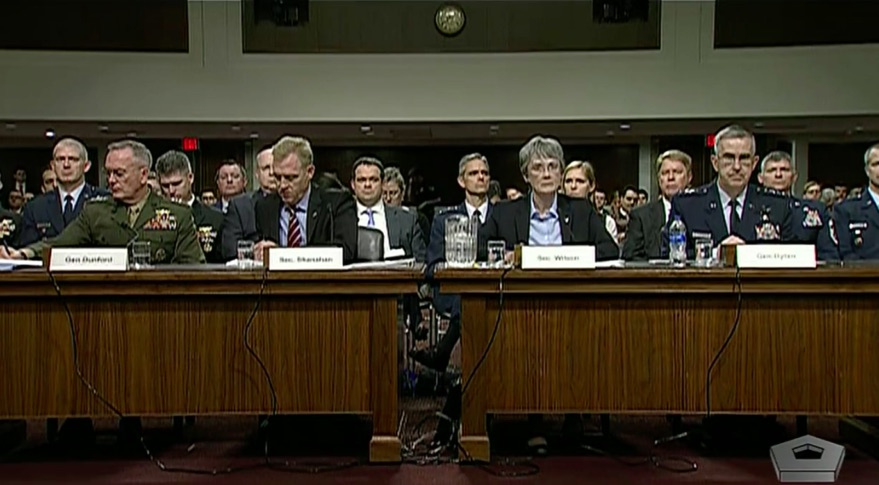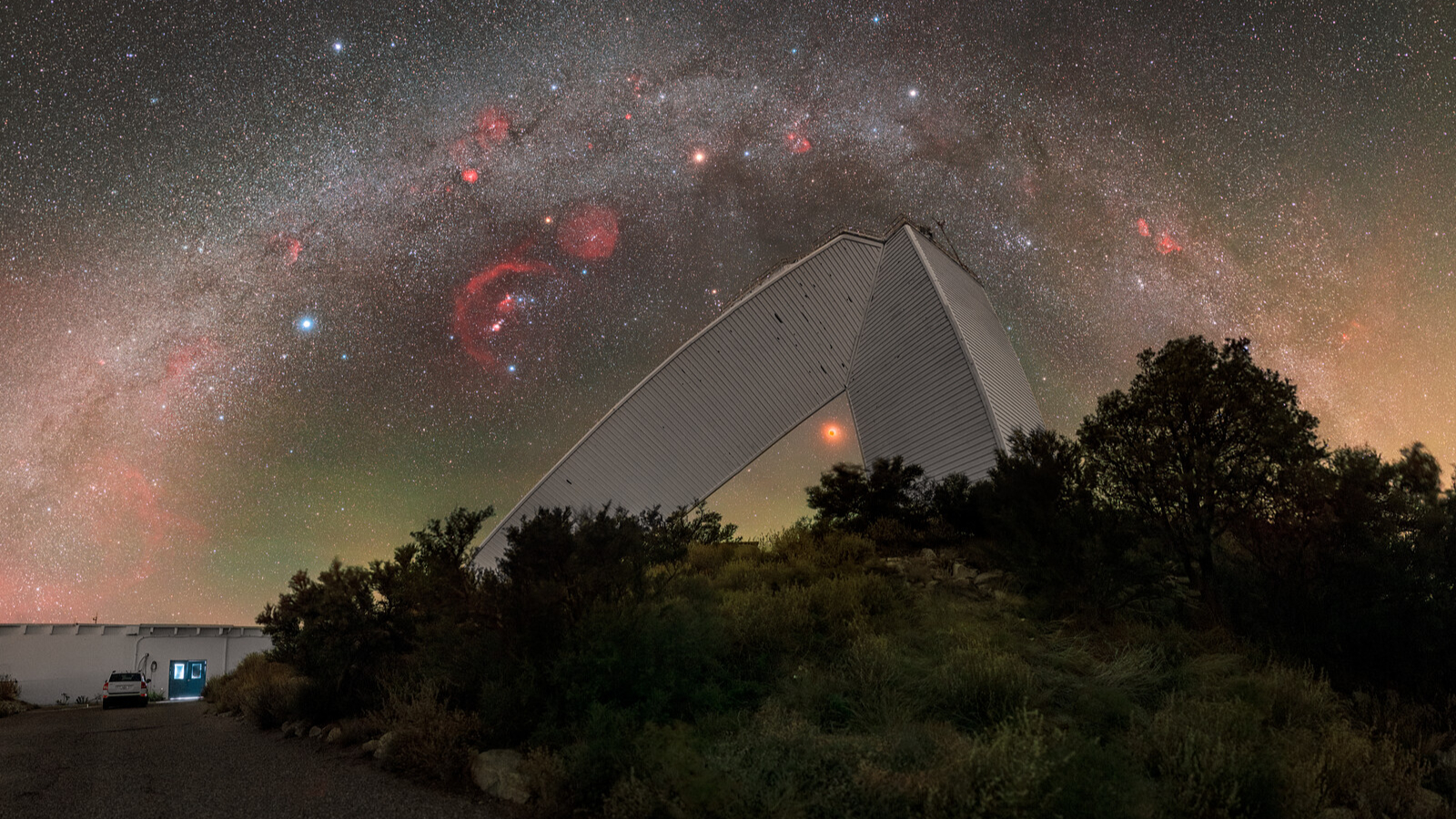Defense Officials Get a Grilling at Space Force Hearing

COLORADO SPRINGS — Since the Pentagon rolled out its Space Force proposal March 1, Defense Department officials met with staff directors and professional staff members from defense committees multiple times on Capitol Hill to provide a detailed explanation of DoD's plan to establish a new military service for space.
In preparation for Thursday's Senate Armed Services Committee hearing on the Space Force proposal, Acting Defense Secretary Patrick Shanahan himself in recent weeks participated in seven meetings with committee members, a defense official told SpaceNews.
This hearing was seen as a key barometer of how SASC is leaning as the committee prepares to mark up the 2020 National Defense Authorization Act. The Trump administration wants the Space Force to be enacted in the NDAA by October 1.
Related: Plans for Space Force Laid Out at National Space Council Meeting
Pentagon leaders in those meetings leading up to the April 11 hearing consistently heard the following questions from lawmakers and staff: Why is a Space Force needed? Why is both a Space Force and a Space Command necessary? The Air Force is doing a good job in space, so why change? They also heard concerns about the cost of the new branch and objections to creating additional Pentagon bureaucracy at a time when military resources are stretched.
The same issues and many more were raised at the hearing where Shanahan testified alongside Air Force Secretary Heather Wilson, Chairman of the Joint Chiefs of Staff Gen. Joseph Dunford and Commander of U.S. Strategic Command Gen. John Hyten.
SASC Chairman Sen. James Inhofe (R-Okla.) said the hearing was an "opportunity to continue to gather facts and to fully explore the proposal. … This is one of those rare times when we're having a hearing where people haven't already made up their minds."
Get the Space.com Newsletter
Breaking space news, the latest updates on rocket launches, skywatching events and more!
But it soon became apparent that several committee members from both parties are deeply skeptical of the Pentagon's Space Force proposal and the testimony from the witnesses did not appear to sway their judgment.
SASC members generally agreed that DoD has to invest in space systems and modernize its satellites as rival nations step up the development of anti-satellite weapons to deny the United States access to critical space-based services like communications and GPS navigation. But questioned why a top-heavy bureaucracy is needed to do that.
Air Force Secretary Wilson told reporters on Wednesday at the Space Symposium that the projected size of the Space Force is about 15,000 people — 5,000 civilians and 10,000 active duty, National Guard and reserve troops. That would be the military's smallest branch. She noted that space is "capital intensive business" and the operation of satellites doesn't require a lot of people.
The Space Force would be in the Department of the Air Force, led by an undersecretary of the Air Force for Space and two four-star general officers, a Chief of Staff and a Vice Chief of Staff.
Why a separate service
"I hope our witnesses will explain why the Space Force requires a separate and dedicated undersecretary, unlike the Marine Corps [which is much larger] and whether such a top-heavy bureaucracy is necessary for such a small fighting force," said SASC Ranking Member Sen. Jack Reed (D-R.I.)
Reed and others said they would specifically challenge the part of the proposal that seeks congressional authorization to set up a new civilian personnel system exclusive to the Space Force that would be exempted from the statutory rules and protections applicable to most other federal employees.
The Pentagon sought to keep the cost of the Space Force down by staffing it with existing personnel, mostly from the Air Force. It requested $72 million in fiscal year 2020 to stand up a headquarters of about 200 people. And DoD projects the cost to build the force over the next five years will be $2 billion. Reed said those numbers are suspect. "It is highly unlikely that the bureaucracy of the Space Force will remain flat over time," he said. "I think providing DoD with wide legislative authority to create a new proxy without more robust budget details is risky."
Members also questioned why the Space Force does not include the National Reconnaissance Office which plays a key role developing and operating the nation's spy satellites.
Related: Spy Satellite NROL-71 Soars on Secret Mission Atop Delta IV Heavy Rocket (Launch Photos)
When it came time to explain the rationale for the Space Force, Shanahan called the proposal "threat-driven." He said threats are "increasing and the importance of and the opportunities in space are growing." Shanahan also argued the Space Force is needed to centralize the management of space activities. He said today DoD has five Senate-confirmed officials who are responsible for more than 10 organizations developing space capabilities in a "very federated fashion."
But members poked holes in the Pentagon's argument by pointing out that there is no obvious problems with how space is being managed today under the Air Force.
"My impression is you all are doing a good job," Sen. Angus King (I- ME) told Wilson. "We are getting the data that we need, we're getting the support from the Air Force. We're working together with the NRO and other agencies. And as I think many of you, or all of you have testified, we're dominant in space right now."
Hyten pushed back. "I think we have been doing a good job, but we've been doing a good job in an environment where space has not been contested," he said. "What is changing is we have adversaries that are building significant capabilities that can challenge us in space. … We have to have a commander focused on it all the time from an operational perspective. And we have to have somebody in the Pentagon that focuses their total attention on space all the time."
King said it is still hard to see how a "new box in an organizational chart" is going to help us to respond to that challenge.
Both Shanahan and Wilson pointed out how successful the Air Force has been at the space mission.
"Because of our airmen and Secretary Wilson's leadership in particular we are the best in space," said Shanahan.
Wilson dittoed that. "The United States is the best in the world at space and our adversaries know it," she said.
Dunford offered praise as well. "I think we do have a good culture in the Air Force. And again, we are the best at space." But he agreed with Hyten that an organization is better off if the leadership is "singularly focused on a single core competency, that being space."
A combatant command and a service
The question of why DoD is creating a Space Command and also a Space Force was raised by Sen. Tom Cotton (R-Ark.), who asked Hyten to explain "why we need to put all space assets, space forces into a separate service as opposed to a combatant command."
Hyten said a service is required to develop the expertise that the combatant command would need.
Cotton challenged that premise. DoD is not going to have actual soldiers in space fighting who need a different set of skills, he said. Space warfare is primarily going to be about technology and acquisitions, he added. "So I think what a lot of us on the committee are trying to figure out is what's the incremental advantage of having a separate Space Force like the Marine Corps is to the Navy within the Air Force as opposed to say the Air Force having the training and equipping function that the five services have for a combatant command."
Sen. Dan Sullivan (R-Alaska) said one of his "overriding concerns" with regard to the Space Force is not that it is not important or that it's a bad idea, but that is could drain resources from other priorities such as military combat readiness.
Dunford disagreed. "Let me tell you how I think about this. I don't look at it's either space or readiness. … Space Force really is, in my judgment, related to readiness."
In one of the most compelling exchanges in the hearing, Sen. Gary Peters (D-Mich.) reminded the witnesses that Wilson less than two years ago was fiercely opposed to the idea of a separate space service.
"I don't think there is any disagreement from folks on this committee that space is something that we need to focus a great deal on … and that we need to do a better job of coordinating and integrating space into our overall defense strategy," Peters said. "But we can't just keep throwing money after dollars after dollars."
Then he addressed Wilson. "I hate doing this but I think it's important because I think you said this best of anyone. In 2017 after a meeting with the Senate appropriations subcommittee talking about the space force, you said the Pentagon is complicated enough. This will make it more complex, and more boxes to the organization chart cost more money. If I had more money, I would put into the locality not bureaucracy," Peters said. "Secretary Wilson, I think that is profound."
Sen. Doug Jones (D-Ala.) pressed Wilson to explain what changed her mind. "I've read statements of yours in the past where you have talked about the need for a Space Command versus a Space Force, maybe not both. … But let me just put it this way: Had the president of the United States not issued an order about creating this, would this be something that you would be coming to the Senate Armed Services Committee recommending?"
Wilson did not respond to that particular question and instead gave praise to the president. "He has done us a service by elevating this conversation and making the challenge we face in space a kitchen table conversation. … The president has proposed and you all have supported two consecutive years of double-digit percentage increases in the space budget and there's another one before you today in the FY 20 budget. And we're having a hearing on how America needs to dominate in space. And I think we need to give him credit for that."
Acquisition problems
In a later exchange with Shanahan, Sen. Mike Rounds (R-S.D.), pointed out that one of the problems he heard from DoD is that the acquisition system does not allow the military to take advantage of emerging commercial technology and innovation.
"Would not a Space Force have the same unfortunate bureaucratic problems that the Air Force has to deal with today?" Rounds asked.
Shanahan said the solution to that problem is the Space Development Agency, which DoD established last month and did not require congressional authorization. The SDA will "really leverage the commercial innovation," he said.
Some of the most pointed questions came from Sen. Joe Manchin (D-W.V.). "I'm having a real hard time understanding why we need this other agency," he told Shanahan. "You have got everything at your disposal right now … and the Air Force has the expertise and there are some flaws in it and you want more attention to it, we will give you what else you need," he added. "This doesn't make any sense to me."
He asked Shanahan to explain "why you think we need this other agency."
Shanahan's response: "The very short story is the amount of change that is taking place in this environment we are not prepared to address."
Manchin also noted that Wilson was testifying in support of the Space Force proposal but opposes the Space Development Agency. When asked to elaborate, Wilson said the SDA is "not part of the president's proposal," and she added: "Senator, you know what I am saying here is not new. My memorandum to the Secretary on this subject has been reported on publicly and I did not support it."
- Read SpaceNews for the Latest Space Industry News
- Military Space - Spacecraft, Weapons and Tech
- Presidential Visions for Space Exploration: From Ike to Trump
This story was provided by SpaceNews, dedicated to covering all aspects of the space industry.
Join our Space Forums to keep talking space on the latest missions, night sky and more! And if you have a news tip, correction or comment, let us know at: community@space.com.

Sandra Erwin covers the military and national security beat as a Senior Staff Writer at SpaceNews. Sandra, based in Arlington, Virginia, specializes in Defense Department and Intelligence Community space programs, policy, budgets, technology and the industry that supports this sector. She joined SpaceNews in October 2017. Before coming to SpaceNews, Erwin covered the U.S. military, the Pentagon, Congress and the defense industry for over two decades as editor of the National Defense Industrial Association's National Defense Magazine and Pentagon correspondent for Real Clear Defense.

